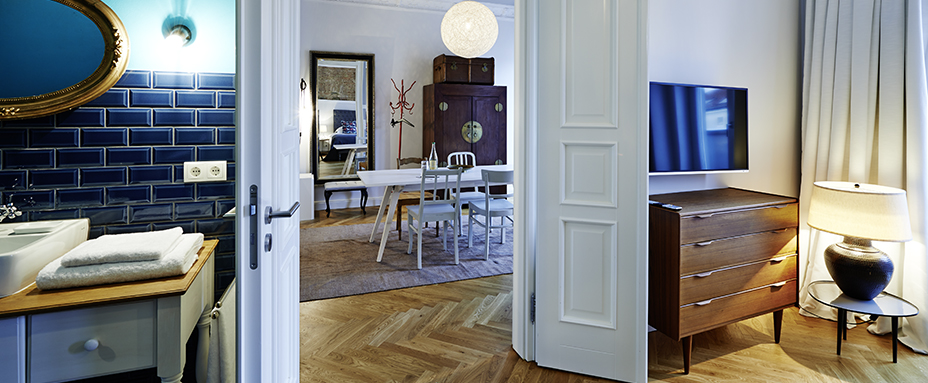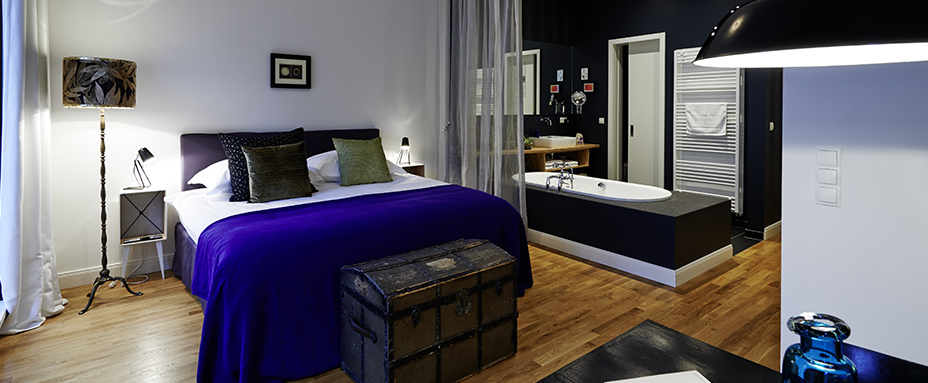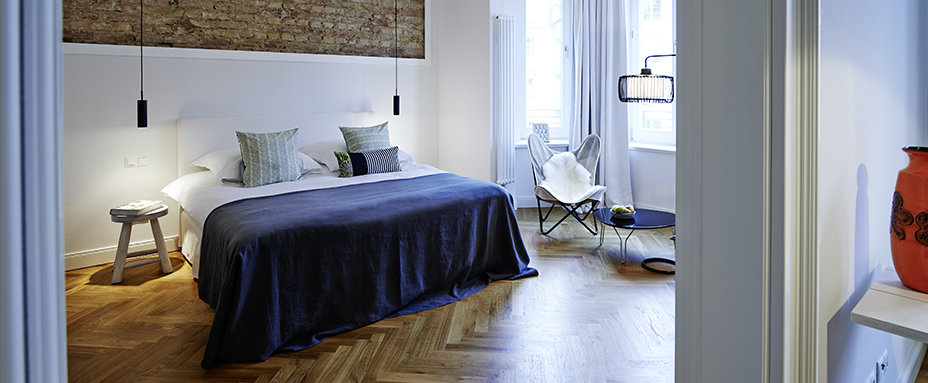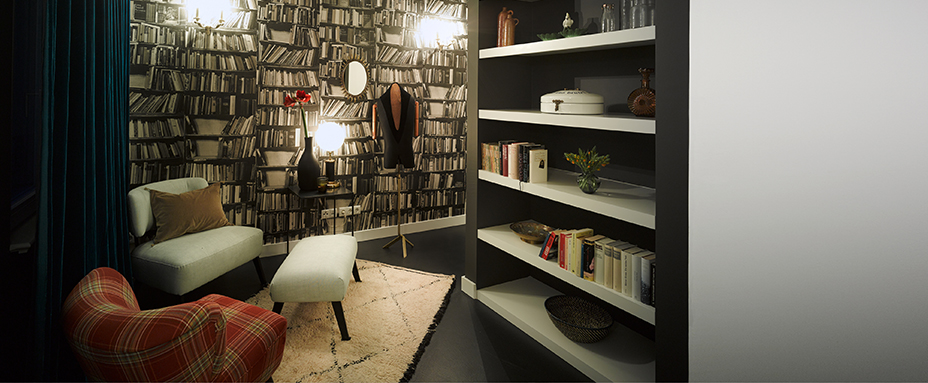



Mais c’est également depuis peu le nom d’un hôtel en plein cœur du fameux quartier de Mitte. Disons-le : Gorki est indiscutablement un de mes derniers coups de cœur.
Gorki a tout d’un hôtel MyMoonSpots. Une entrée (volontairement) bien camouflée. Un accueil plus que chaleureux et détendu. Ils sont comme ça les allemands. Efficaces et ouverts. Dans ce lieu génial comme ailleurs dans la ville on se prend décidément très peu au sérieux.
Je fais vite la connaissance de Peter. Il a le look du loueur de vélos avec sa casquette, ses bretelles et son pantalon en jacquard. Il me sert la main, un sourire brillant aux lèvres et se présente comme le manager. Ici, on est loin du so french conservatisme. On sent en se baladant dans la rue, que Berlin bouillonne, que cette ville est en effervescence permanente. Personne ne semble gêné voire muselé, le champ des possibles est infini. Avec Berlin, l’Allemagne nous apporte la preuve qu’en dépit d’une Histoire culpabilisante, une ville peut totalement se retourner pour à nouveau inspirer et séduire. Berlin est la ville de tous les contraires, dans laquelle un passéisme nostalgique flirte avec une modernité branchée. C’est intense, souvent émouvant.
It’s also the name of a hotel in the heart of the famous district, Mitte. Let’s just say that Gorki is unquestionably one of my latest infatuations. Gorki embodies a MyMoonSpots hotel. An entry (intentionally) well disguised. A welcome more than warm and relaxed. The Germans are known to be that way, effective and open. In this amazing place, like elsewhere in the city, we definitely take it lightly. Very quickly, I get to know Peter. He has a look of someone who works at a bike rental, with his cap, braces and jacquard woven pants. He gave me a handshake, a bright smile and presented what there is to eat. Here, we’re far from the so French conservatism. You feel like walking on the streets, which boils Berlin, this is the city’s bustle. Nobody seems bothered or even muzzled, the range of possibilities are endless. With Berlin, Germany is living proof that despite guilt-provoking history, a city can completely turn around for a new aspiration and seduction. Berlin is the city of all opposites, in which a nostalgic attachment to the past flirts with modern trendiness. It’s intense, often emotional. Back to Peter. He tells me, amusingly, he was a comedian in one of the most popular theaters in Berlin, the Deutsches Theater, until the desire of running a hotel came trotting in his mind. He meets with investors who just so have the idea of creating high-end apartments in the new Mitte district, a few meters from the famous Kastanianallee and Kollwitz Platz, the central points connecting Berlin. Five years of work later, the project was born, in the form of 34 well-designed apartments, finished with rare attention to detail. For this work, we must applaud Pauquet Sandra, a young Franco-German architect who moves back and forth between Paris and Berlin. She cleverly and audaciously knew how to work with the 34 spaces and furnished them differently, always accurately. Mixed with pieces of Knoll along with others, it’s tastefully vintage, antiqued from flea markets throughout Europe. Here, it’s the eclecticism which takes precedence: Gorki allows kitchens to be invited in the rooms, the bathrooms fit nicely next to the beds, the space is reworked without indication. “Our guests rave about the privacy that Sandra Pauquet has instilled in each room,” says Peter.
Here, privacy is put in place. The lobby is deliberately out of sight when entering the premises. If you approach a need for service, you can request it anonymously, if you prefer. Peter is not a comedian anymore, but he continues to meet artists and brings them into the universe of Gorki. These two worlds don’t brush against each other, they complement each other. Many directors have come to make films, young artists settle regularly in one of two penthouses for several days for shoots. More than a hotel, Gorki is a place for life, movement, in which emotion is palpable. “Gorky is not a product, but an idea, a philosophy of life,” confirms Peter.
Gorki is undoubtedly the mirror of the frenzy that gripped East Berlin in recent years. Not a street that is under construction, not a street corner without a shop or a trendy cafe in place, and a spot of old crumbling neighborhoods or old abandoned factories. Incidentally, this creative energy comes to erase whole pages of history. No need to reserve tables or seek advice of addresses that are not touristy. There’s enough things to do to not wind up at a brunch, a Vietnamese restaurant or affordable, tasty Italian. Convinced?
Ici, la confidentialité est de mise. Le lobby est volontairement hors du champ de vision lorsque l’on pénètre les lieux. On s’en approche si un besoin de service devient nécessaire, on s’en détache si on préfère rester anonyme.
Si Peter n’est plus comédien, il continue à côtoyer des artistes et les fait entrer dans l’univers Gorki. Ces deux mondes ne s’effleurent pas, ils deviennent complémentaires. Plusieurs réalisateurs sont venus tourner des films, de jeunes artistes s’installent régulièrement dans un des deux penthouses pendant plusieurs jours pour y faire des prises de vue. Plus qu’un hôtel, Gorki est un lieu de vie, en mouvement, dans lequel l’émotion est palpable. « Gorki n’est pas un produit, mais une idée, une philosophie de vie » confirme Peter.
Gorki est sans nul doute le miroir de la frénésie qui s’est emparée de Berlin Est ces dernières années. Pas une rue qui ne soit en réfection, pas un coin de rue sans une boutiques ou un café tendance en lieu et place d’anciens quartiers délabrés ou de vieilles usines désaffectées. Au passage, cette énergie créatrice vient gommer des pages entières d’histoire. Nul besoin de réserver des tables, ou de se faire conseiller l’adresse qui ne soit pas touristique. Il suffit de faire quelque pas pour tomber sur un brunch à tomber, un vietnamien ou un italien abordable et savoureux. Convaincu ?